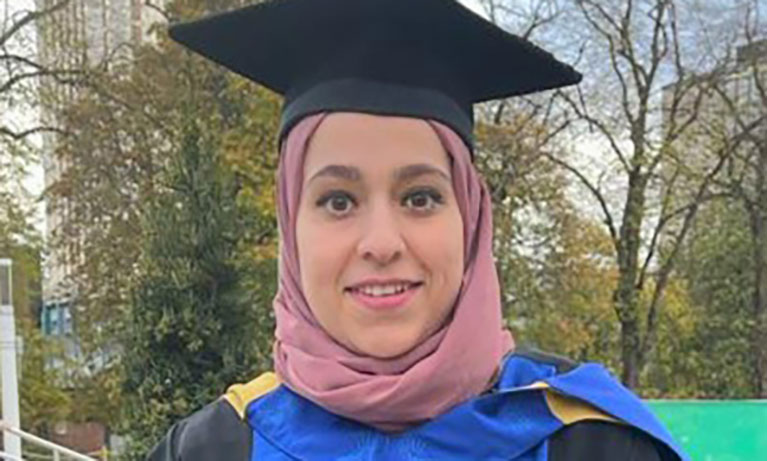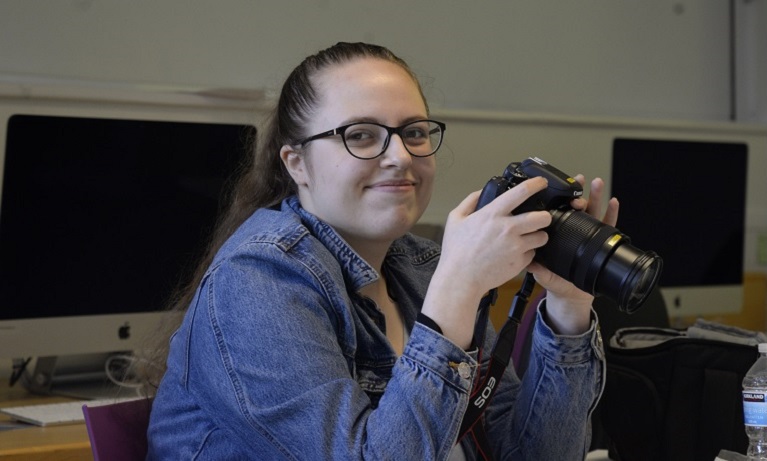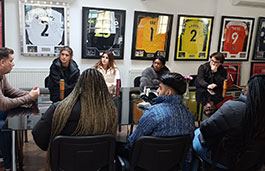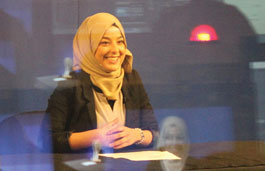Search
Global Journalism and Public Relations MA
Study level: Postgraduate
Prepare for a career in global communications, explore rapid industry changes and enhance your theoretical and practical expertise in journalism and public relations.
Course features
Year of entry
Location
Coventry University (Coventry)
Study mode
Full-time
Duration
1 year full-time
Course code
CAST019
Start date
January 2026
March 2026
May 2026
July 2026
Course overview
Whether you're passionate about journalism and public relations (PR) or a professional looking to enhance your expertise, this course prepares you for a career in both fields.
5 QS Stars for Teaching and Facilities
QS Stars University RatingsRanked 9th Modern University in UK by the Times
The Times and Sunday Times Good University Guide 2025Ranked 4th for Overall Satisfaction in PTES
Postgraduate Taught Experience Survey (PTES) 2025Why you should study this course
- Learn a combination of practice-orientated skills in both journalism and PR, giving you with a competitive edge
- Study an industry-relevant curriculum developed in consultation with leading media companies
- Work with print, digital, audio, video, mobile and immersive content, providing hands-on opportunities through a multimedia, industry and experience-centred approach with a team of internationally renowned academics and practising journalists (subject to availability)
- Get access to industry-standard TV and radio studios, editing suites and software, to perfect cross-platform journalistic skills4
- We provide you with opportunities to make industry connections with experts such as research specialists, global journalists and public-media relations players.2
Collaborations

Endorsement by the Royal Society for Arts, Manufactures and Commerce (RSA)
Coventry University and the RSA have collaborated on a module concerning social and ethical responsibility. You will be entitled to a 12-month fellowship of the RSA so you can access all RSA resources and platforms during your period of study. Once you have successfully passed the Professional Practice and Innovation module, you will receive an RSA digital credential.
The Global Journalism and Public Relations MA course helped me build a portfolio that prepares me for job hunting as a professional journalist. I got the unique opportunity to gain an in-depth knowledge of journalism and communications, leading me to be named joint-winner in the broadcasting (television) category of the Midlands Media Student's Awards 2023.
Rima Ayoubi, Global Journalism and Public Relations MA, 2023

What you'll study
This course aims to equip you with the expertise and knowledge necessary to navigate professional practices of journalism and PR. Develop relevant skills and critically engage with journalistic techniques, international relations, global politics, and the strategies and role of PR in a global context.
We regularly review our course content, to make it relevant and current for the benefit of our students. For these reasons, course modules may be updated.
How you'll learn
Teaching and learning methods may include:
- lectures
- seminars
- tutorials
- presentations
- group projects
- workshops
- practical studio sessions.
We apply a project-based interactive approach to teaching and learning, where real-world and current events in global journalism and PR are used as cases for enhancing practical skills in journalism using new and emerging technologies and strategies.
Teaching and learning hours
As a full-time postgraduate student, you will study modules totalling 180 credits each academic year. A typical 30-credit module requires a total of 300 hours of study. Study hours are made up of teaching and learning hours, and guided and independent study.
Teaching hours
Teaching hours will vary, depending on where you are in your studies, but on average, you will have between 8 and 12 teaching and learning hours each week. You will also have the opportunity to attend optional sessions, including time with a Success Coach or to meet with staff for advice and feedback.
Guided and independent learning
Throughout your studies, you will be expected to spend time in guided and independent learning which will make up the required study hours per module. You will be undertaking a variety of activities, learning through guided background research, planning and preparation, studio activity, creative practice and making, reviewing what you have learned and completing assignments. This can be completed around your personal commitments. As you progress towards the end of your studies, you will spend more time on independent learning.
Online learning
As an innovative university, we use different teaching methods, including online tools and emerging technologies. So, some of your teaching hours and assessments may be delivered online.
Assessment
This course will be assessed using a variety of methods which could vary depending on the module. Assessment methods may include:
- presentations
- group projects
- live simulations
- individual application development work
- portfolios
- written documentation.
The Coventry University assessment strategy aims to ensure that our courses are fairly assessed and allows us to monitor student progression towards achieving the intended learning outcomes.
The most exciting moments on this course are those in which students have glints in their eyes, like when their course magazine is just published online or ‘hot off the press’ prints arrive on campus, after they’ve watched the broadcast of their segment on Global Pop-up News and Global News Relay, or when they rub shoulders with prolific and distinguished guests during high-profile events such as the Global Peace Forum hosted by our Centre for Peace and Security.
These challenging yet rewarding undertakings help students build their portfolios, confidence and networks useful for professional experience and employability.
Dr Fred Mudhai, Global Journalism and Public Relations MA Course Director, 2023

Entry requirements
Typical entry requirements:
Fees and funding
| Student | Full-time | Part-time |
|---|---|---|
| UK, Ireland*, Channel Islands or Isle of Man | £11,200 | Not available |
| EU | £11,200 per year with EU Support Bursary** £18,600 per year without EU Support Bursary** |
Not available |
| International | £18,600 | Not available |
For advice and guidance on tuition fees3 and student loans visit our Postgraduate Finance page and see the university's Tuition Fee and Refund Terms and Conditions.
We offer a range of international scholarships to students all over the world. For more information, visit our International Scholarships page.
Tuition fees cover the cost of your teaching, assessments, facilities and support services. There may be additional costs not covered by this fee such as accommodation and living costs, recommended reading books, stationery, printing and re-assessments should you need them.
The following are additional costs not included in the tuition fees:
- Any optional overseas field trips or visits: £400+ per trip.
- Any costs associated with securing, attending or completing a placement (whether in the UK or abroad).
*Irish student fees
The rights of Irish residents to study in the UK are preserved under the Common Travel Area arrangement. If you are an Irish student and meet the residency criteria, you can study in England, pay the same level of tuition fees as English students and utilise the Tuition Fee Loan.
**EU Support Bursary
Following the UK's exit from the European Union, we are offering financial support to all eligible EU students who wish to study an undergraduate or a postgraduate degree with us full-time. This bursary will be used to offset the cost of your tuition fees to bring them in line with that of UK students. Students studying a degree with a foundation year with us are not eligible for the bursary.
Facilities
Our postgraduate journalism courses have a dedicated area within the Ellen Terry Building consisting of three interconnected rooms that currently comprise two 'newsrooms', one of them doubling as a seminar room and the other as a Mac Lab with industry-standard Adobe software.
You will have access to two fully equipped radio studios. Practical teaching and technical instruction also take place in The Tank TV studio in The Hub.
Borrow specialist equipment to support your projects and assignments from our media loan service. Whatever you need for your audio, video or photography requirements, we probably have it. We can also offer technical advice and help with using equipment.

Lanchester Library
The library is usually open 364 days a year. It’s where you can access your course’s specialist Academic Liaison Librarian. It’s also home to specialist teams which can support you with your academic writing and maths and statistics questions.

The Hub
The Hub is the centre of student life on campus. Facilities include a food court, convenience store, multi-faith centre, medical centre, hairdresser, coffee shops and the Your SU offices. It has fully licensed function spaces and a bar.

Careers and employability
Get one-on-one guidance lasting up to 18 months from the end of your course. We’ll help you find placements and graduate roles, offer CV and application checks, mentoring, skills workshops, employer events and more.
Facilities are subject to availability. Access to some facilities (including some teaching and learning spaces) may vary from those advertised and/or may have reduced availability or restrictions where the university is following public authority guidance, decisions or orders.
Careers and opportunities
Potential career paths include:
- Journalist
- Public relations management
- Project management and coordination
- Staff writer
- News planner
- Social media content creator
- Immersive journalist
- Marketing content specialist
- Public relations executive
- Editor
- Social media manager.
On successful completion of this course, you will be able to:
- apply systematic knowledge of key issues, debates, practices and processes relating to global politics and international relations
- understand and strategically apply advanced principles and techniques of global journalism and PR including written, audio, video and presentation with respect to conventions, legal and ethical codes and specific genres
- critically evaluate the influence of marketing communications on media and markets
- demonstrate systematic engagement with and evaluation of journalistic work within their specialist field with reference to academic and professional conventions
- produce journalistic work that shows advanced understanding of key issues, concepts and principles in their area of specialisation and an awareness of specialist and non-specialist audience needs
- engage with and strategically utilise research methods and specific research methodologies such as textual analysis and interviews
- demonstrate an advanced understanding of the evolving nature of journalistic and PR practice and apply appropriate skills to the production of work for emerging media platforms.
Where our graduates work
Due to the focused and transferable skills that this course offers, our graduates have secured jobs in diverse areas that include:
- TV reporter and presenter at Porto Canal channel in Portugal
- Radio reporter with German public broadcaster NDR in Hamburg
- Staff journalist at a Turkish news agency foreign desk
- Freelance journalist
- Managing editor for a specialist UK outlet on camping and caravanning
- Web publisher at global public relations and advertising agency Cheil
- Marketing for retail chain Sonae MC in Portugal
- Public relations and marketing communications with London-based Four Agency Worldwide
- Strategic relationships at associate director level with UK regulator Ofqual
- Digital workplace manager in Europe, the Middle East and Africa for Canada-based international investment agency Colliers.
This course has helped me in jump-starting my career as a journalist. The many journalistic projects I got to participate in because of this course helped me in building a professional portfolio that I can be proud of.
Jana Buxbaumova, Global Journalism and Public Relations MA, 2022/23

How to apply
You may also like

Sports Journalism MA






